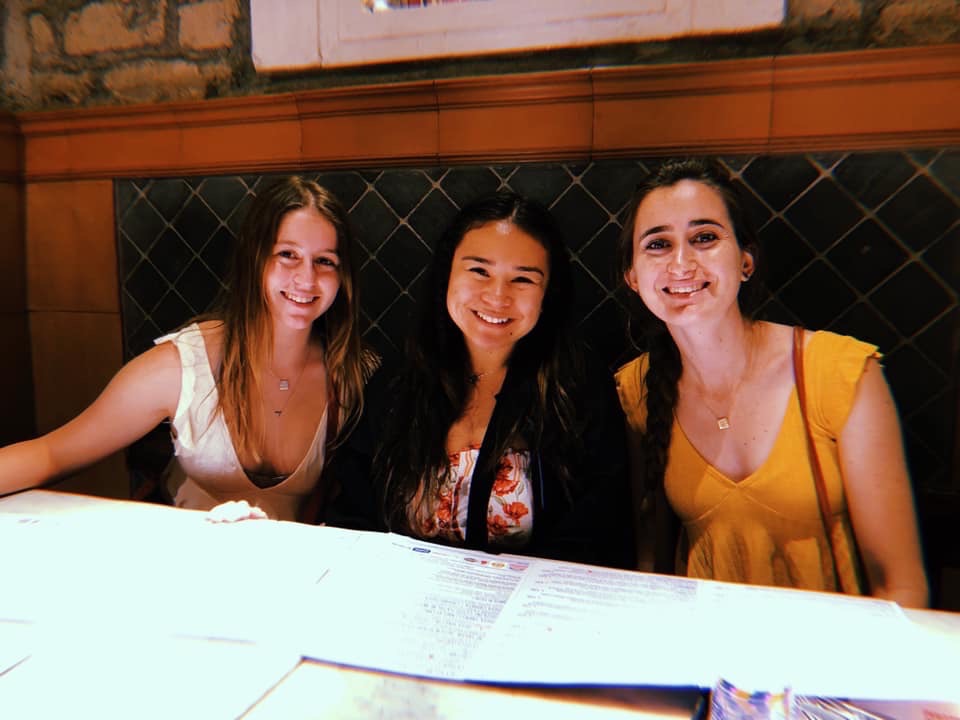Challenge: Protective Cap for UEOI
Challenger: veteran amputees
University Partner: San Diego State University
Student Team: Tatyana Guerrero, Kelly Bernal, Jade Sommers, and Sophia Stepp
Faculty Advisor: Scott Shaffar
QL+ Program Manager: Annemarie Orr
Project Summary:
Team BioShield has been sponsored by Quality of Life Plus to design and create a protective cap for individuals with osseointegration. The team conducted research for materials, impact, and safety. The team members were able to work directly with our challenger, Nick Kimmel. The device is required to attach to the attachment piece provided by the challenger. Other requirements were the protection of the residual limb and implanted abutment screw from impact, ability to absorb shock, provide quick donning and doffing, be lightweight and water-resistant, and have a low profile.
After research and design brainstorming, the team decided on a curved profile consisting of three layers and a rod-spring assembly used for detachment from the user. Starting from the outermost layer, the layers are made from DragonSkin 30 silicone, carbon fiber, and polyurethane foam. The outside silicone layer provides the main shock absorption while the hard middle carbon fiber layer also provides some shock absorption and protection from impact. The inner layer made from polyurethane foam is used to protect the user from harm during impact by providing a soft cushion that may come into contact with the skin. The team has collected safety data sheets for each material, making sure to choose materials that are non-toxic and non-irritating. Adhesives and paints used during manufacturing are safe for skin contact as well.
The team has worked with a virtual workspace, including Google Drive and GrabCad. Team members utilized SolidWorks for 3D modeling of the device, as well as ANSYS for impact testing. Models were used in order to create various components and 3D molds needed for manufacturing. 3D printed molds were created for the silicon and carbon fiber layers. The press-fit casing and attachment piece were also 3D printed. Had COVID-19 not happened, the team would have created this press-fit casing out of metal to improve the durability of the product.
After manufacturing, the device underwent testing for a range of temperatures, the ability to handle UV exposure, be water-resistant, have no protrusions, be non-slip and non-irritating, and be able to withstand impact. Each test received a pass, with two receiving conditional passes due to COVID-19. For the temperature test, the device was placed in an oven at 135℉ and in a freezer at 0℉ for two hours each. The device showed no signs of cracking in the hot and cold temperatures. In the absence of COVID-19, the device would have been placed in dry ice, but still received a conditional pass because the materials were rated for temperatures below 0℉. The materials also showed resistance to 10 hours of UV exposure and water in the UV exposure and water resistance tests. The non-slip test scaled-down the 220N requirement down using a 5lb weight and a silicone square attached to a hard plastic, which was then dragged across a wet and dry surface. This verified that the outside silicon material is non-slip and able to withstand 220N of force when leaned on. The foam material was placed on each team member and showed no irritation after 10 hours. Finally, ANSYS was utilized for impact testing since no in-person tests could be performed.

The device was able to withstand a force of 500N, resulting in maximum stress of 0.1617GPa, which is well below the tensile strength of 3.5GPa for carbon fiber. The maximum deformation was 0.326 inches, which is below the critical deformation of 2 inches. This impact testing showed that the device would not fail under this force, assuming a head-on impact. This test has been given a conditional pass since an in-person Charpy impact test could not be performed due to COVID-19.

Photo Gallery




